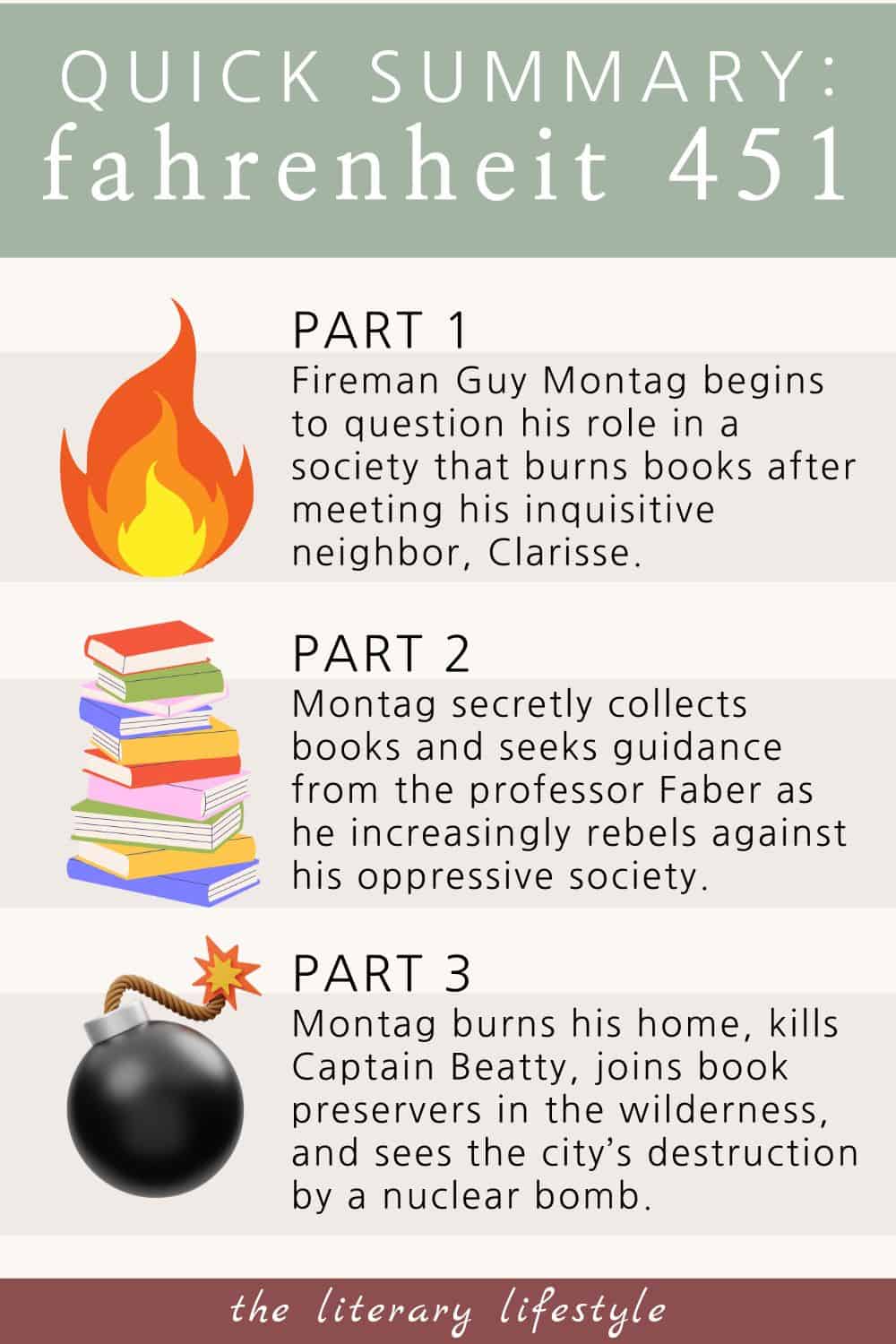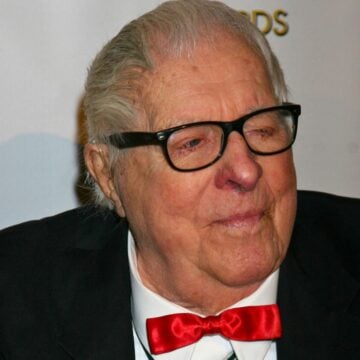Read this summary of Fahrenheit 451 for a full explanation of what happens in each part of this classic book. Ray Bradbury advocated against book bans and the reliance on technology. You’ll discover exactly what he said and why these themes still ring true today, several decades after he first published it in 1953. Let’s get literary!

Short Summary of Fahrenheit 451 With Spoilers

In Part 1, in a futuristic 24th-century America, fireman Guy Montag burns books in a society where they are outlawed. After meeting his young and curious neighbor Clarisse, Montag begins to question his role and the meaning of his work. His dissatisfaction grows as he faces personal crises, leading him to secretly collect and read books to challenge the oppressive norms of his society.
In Part 2, Montag attempts to persuade his wife Mildred that books could address their problems, but she prefers watching television. So, he visits Faber, a former professor, who provides him with an earpiece for remote assistance and explains that books can offer deeper meaning. When Montag reads aloud to Mildred’s friends, they react with fear and leave, prompting Faber to advise Montag to burn the book to avoid arrest. This leads Montag to deliver it to Beatty at the firehouse.
In Part 3, Montag discovers that Mildred has reported him for hoarding books, leading him to burn his home under Beatty’s orders. He kills Beatty in a confrontation, destroys the Mechanical Hound, and flees to Faber’s house. Faber advises him to escape to the wilderness, where Montag joins a group led by Granger that preserves books by memorizing them. After surviving a nuclear attack on the city, Granger inspires Montag to rebuild a society that values books and critical thought.
Full Summary of Each Part of Fahrenheit 451
Chapter 1: The Hearth and the Salamander
Fahrenheit 451 begins with one of the most famous opening lines in literature:
“It was a pleasure to burn.”
Read More: Quotes From Fahrenheit 451 | Quotes About Banned Books
Burning refers to the burning of books and fireman Guy Montag, who lives in a futuristic society somewhere in 24th-century America. Books are outlawed and it is his job to burn them—not to put out fires.
On the way home from work one day, Montag meets his neighbor, Clarisse McClelan, an analytical, nature-loving, and liberal-minded 17-year-old who asks him questions that force him to think, like, “Do you ever read any of the books you burn?” He’s left feeling uncomfortable yet intrigued by the encounter.
Upon entering his home, Montag finds his wife, Mildred, in bed listening to “Seashells” (earplug radios). He realizes she’s overdosed on sleeping pills. He calls the hospital and two emergency responders pump her stomach with the “Snake” and give her a blood transfusion. They tell him that doctors no longer respond to overdoses because there are so many.
The next day, Mildred has no memory of her suicide attempt and watches the interactive television that comprises three of the living room’s walls. Montag is disturbed by how disengaged she is from reality.
Back at the fire station, the Mechanical Hound, a manmade beast trained to track scents, threatens to attack Montag, and Captain Beatty tells him there’s nothing to worry about unless he is guilty, foreshadowing events to come.
Montag continues to meet with Clarisse at night, and she continues to challenge his ways of thinking — until she goes missing.
Montag then begins questioning whether firemen ever put out fires instead of starting them.
When the firemen prepare to burn the books of an elderly woman, Montag steals a Bible. Shockingly, the woman, refusing to part with her books, sets herself on fire.
Back at home, Mildred, still disengaged, reveals that Clarisse was hit by a car and died.
With the stolen Bible hidden under his pillow, Montag struggles to sleep and can only think of the Mechanical Hound.
Mildred remains consumed in the television. Captain Beatty visits, telling Montag, who thinks he may need a break from work, about the history of censorship. He explains that, over time, people embraced technology, which shortened their attention spans. Also, books caused critical thinking that made people unhappy. So, they chose to outlaw books to maintain society’s peace of mind, which changed the role of firemen from stopping fires to starting them.
Suspecting that Montag stole a book, Captain Beatty mentions that firemen have 24 hours to return books.
When Beatty leaves, Montag reveals that he has actually stolen and hidden several books over time. Mildred wants to burn them, but Montag insists they read them first to determine whether they truly do lack value.
Chapter 2: The Sieve and the Sand
Montag tries to convince Mildred that books may solve the problems that have occurred. The Mechanical Hound looms outside. They begin to read, but Montag struggles to understand the books, and Mildred just wants to watch television.
Montag visits Faber, an old English professor from a time before censorship. Faber is fearful of educating Montag about books until Montag begins to tear his Bible apart.
Then, Faber gives Montag an earpiece to instruct him from a distance. Faber explains that when people have the time to think about what they read, they can find a deeper meaning in life. They hope that, in a coming war, people will rebel, and book bans will cease.
Back at home, Mildred is watching television with a group of disengaged, unhappy friends. When he reads from a book, he scares them and they leave. Faber tells him to burn the book to avoid arrest.
Montag then takes a book to the firehouse and hands it to Beatty, who admits he once read books. The firemen are called to Montag’s house.
Chapter 3: Burning Bright
Montag learns that Mildred has reported him for hoarding books. She leaves silently.
Montag complies with Captain Beatty’s orders and begins to burn his home. When Beatty discovers Montag’s earpiece, he threatens to find Faber. In turn, Montag sets Beatty on fire and kills him. The Mechanical Hound injects Montag’s leg, but Montag is able to destroy it before it does him further harm.
He limps away to Faber’s house, wondering if Beatty had actually wanted to die. Faber instructs him to head to the wilderness, where exiled book owners live, as there is a manhunt underway to catch him.
Downstream, he finds the group, led by a man named Granger. They spend their time memorizing books to preserve them for future generations.
Granger and Montag watch over the television as the authorities fake his capture and execute an innocent man, rather than honestly admit their failure to catch him.
As the city is hit by a nuclear bomb, Granger’s group is far enough away to survive. Granger tells of the Phoenix that rose from the ashes of a fiery death and says that humans can do the same, righting past wrongs along the way.
Montag and his new friends head back to the city to rebuild a society where books and independent, critical thought will be valued.
The Characters: Guy Montag, Clarisse, Captain Beatty, and More
- Guy Montag: the protagonist; a fireman in a futuristic society who burns books, which are outlawed
- Clarisse McClellan: Guy’s next-door neighbor, an intellectual 17-year-old girl who forces Montag to think
- Mildred “Millie” Montag: Guy Montag’s wife, who is engrossed by technology and disengaged from real life
- Captain Beatty: Montag’s boss who once read books but now executes the law by burning them
- The Mechanical Hound: a manmade beast that traces the scent of books
- Professor Faber: an old English professor, who taught before books were banned and instructs Montag on his journey toward enlightenment
- Granger: the leader of a group of exiled book lovers
The Main Points: Themes and Their Meaning
Fahrenheit 451 is a complex literary work with many themes:
- Books: Literature fosters independent thought that allows humans to find deeper meaning in life.
- Technology: Technology makes books less desirable to humans and isolates people.
- Censorship: Censorship limits people from new perspectives and ideas in order to maintain the status quo.
Read More: Review of Fahrenheit 451
About Ray Bradbury and Fahrenheit 451
about

Authored by Ray Bradbury in the mid-20th century, Fahrenheit 451 is a powerful critique of a dystopian society where books are outlawed. It was inspired by Nazi book burnings and the Soviet Union’s governmental control.
Fahrenheit 451 has won awards that include the American Academy of Arts and Letters Award in Literature in 1954, the Commonwealth Club of California Gold Medal, the Prometheus “Hall of Fame” Award in 1984, and the “Retro” Hugo Award in 2004 for the best novel of 1953. It’s also been adapted for both film and stage.
Final Thoughts
To conclude this summary of Fahrenheit 451, I hope you take away from the narrative a chilling warning about the dangers of a society devoid of critical thinking and intellectual curiosity.
Bradbury’s messages about the dangers of censorship continue to resonate strongly today, given the dramatic rise in banned books.
In fact, Bradbury himself has said:
“There is more than one way to burn a book. And the world is full of people running about with lit matches.”

remember, it’s a good day to read a book. – jules

